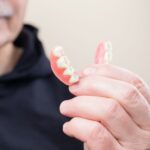Intricacies of Dentures: Expert Insights for Optimal Fit and Function

When it comes to dentures, there’s more than meets the eye. The world of dental prosthetics is a complex realm, requiring a delicate balance of artistry and science. Crafted with precision and tailored to fit seamlessly in the mouth, dentures go far beyond just replacing missing teeth. From understanding the intricacies of materials to mastering the fitting techniques, every step in creating dentures requires meticulous attention to detail. In this article, we delve into the subtle nuances and expert insights that make all the difference in achieving an optimal fit and function for denture wearers.
Intricacies of Dentures
Expert Insights for Optimal Fit and Function
Dentures are a vital dental prosthetic that can improve the quality of life for individuals experiencing tooth loss. However, the intricacies involved in crafting and fitting dentures are often overlooked. As a seasoned dental professional with years of experience, I aim to shed light on the nuances of dentures and provide valuable insights for both denture wearers and those seeking a comprehensive understanding of this specialized dental prosthetic.
Understanding the Complexities
Crafting dentures is a meticulous process that requires a deep understanding of dental materials, techniques, and individual patient needs. Each denture is custom-made to ensure optimal fit and function for the wearer. From selecting the appropriate materials to meticulously adjusting the bite and aesthetics, the intricacies lie in the delicate balance between artistry and functionality.
To achieve a successful denture fitting, it’s crucial for the dental professional to consider the unique anatomy, oral health, and individual preferences of the patient. This personalized approach ensures that the dentures not only restore the patient’s ability to chew and speak comfortably but also enhance their confidence and overall well-being.
Diving into the Details
Let’s explore some key factors that contribute to the intricacies of dentures:
Material Selection: The choice of denture materials plays a significant role in the longevity and comfort of the prosthetic. Options range from traditional acrylic to more modern materials like flexible resins or even metal frameworks for increased stability. Each material has its own advantages and considerations, influencing the intricate decision-making process.
Fit and Stability: Achieving an optimal fit is crucial to prevent discomfort and ensure the dentures stay securely in place. This involves meticulous measurements, impressions, and adjustments to create a snug fit that minimizes irritation and slippage. The intricate balance of fit and stability enhances the denture wearer’s confidence, allowing them to speak and eat with ease.
Bite Alignment: Proper bite alignment is an important aspect of denture functionality. The intricacies lie in the precise adjustment of the denture teeth, ensuring that the upper and lower jaws come together harmoniously. This meticulous process mimics the natural chewing motion, making eating a more comfortable and efficient experience.
Pros and Cons
While dentures offer numerous benefits, it’s important to consider both the advantages and limitations:
- Pros:
- Affordable compared to other tooth replacement options.
- Restore the ability to speak and chew with ease.
Improve facial aesthetics and boost self-confidence.
Cons:
- May require adjustment or replacement over time due to natural changes in the mouth.
- Potential discomfort during the initial adjustment period.
- Requires regular oral hygiene care and maintenance.
Expert Tips for Denture Wearers
Taking care of dentures is as important as the fitting process itself. Here are a few expert tips to optimize your denture experience:
- Soak your dentures in a denture cleaner or mild solution overnight to remove bacteria and stains.
- Brush your dentures gently with a designated denture brush to prevent damage.
- Rinse your dentures thoroughly after meals to remove any food particles.
- Maintain regular dental check-ups to ensure the health of your dentures and overall oral well-being.
In conclusion, the intricacies of dentures go beyond the surface-level understanding. They require a combination of expertise, experience, and attention to detail to ensure a comfortable fit and optimal functionality. By understanding these nuances and following expert tips, denture wearers can enjoy a restored smile and improved quality of life.
Remember, the journey to finding the perfect dentures may seem intricate and overwhelming at times, but with the right dental professional by your side, you can embrace the transformative power of these remarkable dental prosthetics.
Dentures have a fascinating history, with many interesting facts surrounding their creation and evolution. If you’re curious to learn more about these remarkable dental appliances, click here for some intriguing insights. Discover the surprising origins and advancements in denture technology that have revolutionized the field of dentistry. Uncover the hidden secrets of dentures and gain a newfound appreciation for these essential oral prosthetics. Check out our page on interesting facts about dentures to delve into this captivating subject.
interesting facts about dentures
FAQ
Q: What are the intricacies involved in crafting dentures?
A: Crafting dentures involves several intricacies such as taking meticulous measurements of the patient’s mouth, selecting the appropriate materials, designing the dentures to ensure a comfortable fit, and achieving optimal aesthetics.
Q: How long does it take to craft dentures?
A: The time required to craft dentures can vary depending on individual cases. Typically, it takes several appointments over a span of a few weeks to complete the entire process, from initial measurements to final adjustments.
Q: What types of materials are used to make dentures?
A: Dentures can be made using various materials, including acrylic resin, porcelain, and metal frameworks. The choice of material depends on factors such as durability, aesthetics, and cost.
Q: How often should dentures be replaced?
A: Dentures may need to be replaced every 5 to 10 years or when they become worn, ill-fitting, or damaged. Regular dental check-ups are crucial to assess the condition of dentures and determine if replacement is necessary.
Q: How can I ensure optimal fit and function of my dentures?
A: To ensure optimal fit and function of dentures, it is important to follow proper oral hygiene practices, including regular cleaning and soaking of dentures. Additionally, maintaining a balanced diet and visiting your dentist for regular check-ups can help identify and address any issues that may arise with your dentures.
- Unlock 6000+ words beginning with he: A comprehensive analysis - April 20, 2025
- Mastering -al Words: A Complete Guide - April 20, 2025
- Master Scrabble: High-Scoring BAR Words Now - April 20, 2025
















